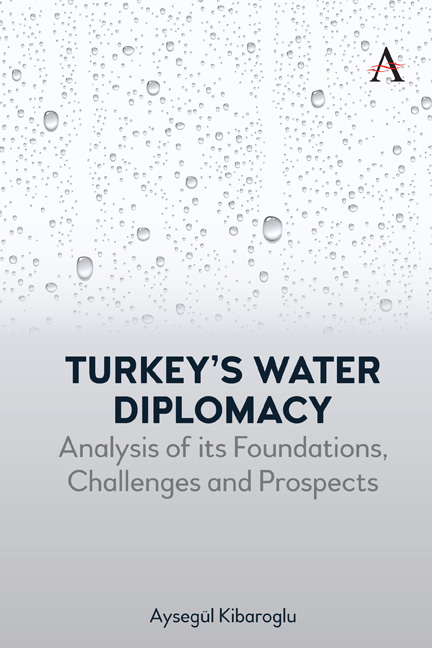Book contents
- Frontmatter
- Contents
- Acknowledgements
- List of Abbreviations
- Introduction
- 1 Institutional Setting
- 2 Water Diplomacy Principles
- 3 Turkey’s Evolving Position vis-à-vis International Water Law
- 4 The Role of History and Geography in Turkey’s Evolving Water Diplomacy
- 5 Analyzing Non-State Actors and Processes in Turkey’s Water Diplomacy Framework
- Conclusion
- References
- Index
4 - The Role of History and Geography in Turkey’s Evolving Water Diplomacy
Published online by Cambridge University Press: 24 March 2021
- Frontmatter
- Contents
- Acknowledgements
- List of Abbreviations
- Introduction
- 1 Institutional Setting
- 2 Water Diplomacy Principles
- 3 Turkey’s Evolving Position vis-à-vis International Water Law
- 4 The Role of History and Geography in Turkey’s Evolving Water Diplomacy
- 5 Analyzing Non-State Actors and Processes in Turkey’s Water Diplomacy Framework
- Conclusion
- References
- Index
Summary
Overview
While the assertion that ‘geography and history play a significant role in foreign policy-making’ (Cohen 2015) is a point that has been well contested, in the case of the Republic of Turkey, the country's own state practices demonstrate that its geographical characteristics have played an important role in the determination of at least its transboundary water policy. Turkey lies at the upstream of several transboundary rivers – namely, the Euphrates– Tigris (ET), Coruh and Kura; it is considered at least one source of the many transboundary tributaries of the River Aras, and is in a downstream position regarding the Orontes and Meric Rivers.
The total surface area of the drainage basins of these rivers comes to 256,000 km2, which constitutes around one-third of Turkey's total surface area. The average water potential of these rivers within Turkey is 70 billion m3 per year, equivalent to 30 per cent of the overall water potential of the country. Transboundary rivers form the basis of 22 per cent of Turkey's borders, constituting at least some of the dividing markers with all neighbours – namely, Greece, Bulgaria, Georgia, Armenia, Azerbaijan, Iran, Iraq and Syria. Moreover, Turkey presides over a significant amount of arable and irrigable land in these river basins; the ET river basin alone constitutes 20 per cent of the country's arable land. Considering the growing demands of the increasing urban and rural populations of these basins, geography clearly lies at the fore in the formulation of transboundary water policies (Kibaroglu 2015).
Since the first years of the Republic of Turkey (established in 1923), the changing nature of relations with various neighbours has determined the subsequent evolution of transboundary water policies. Hence, from the early 1920s until the late 1950s, when Turkey and its neighbours were all engaged with establishing state bureaucracies, their aligned concerns and similar need for socio-economic development paved the way for an overall productive relationship to ensue. Throughout this period, Turkey signed various bilateral treaties, which mostly concerned the delimitation and the nature of use of boundary rivers (Kibaroglu et al. 2011). Also significant is that, at the time, none of the relevant countries pursued any major development projects which would have resulted in utilization of water by one to the detriment of the others (Kibaroglu et al. 2012).
- Type
- Chapter
- Information
- Turkey's Water DiplomacyAnalysis of its Foundations, Challenges and Prospects, pp. 69 - 122Publisher: Anthem PressPrint publication year: 2021



